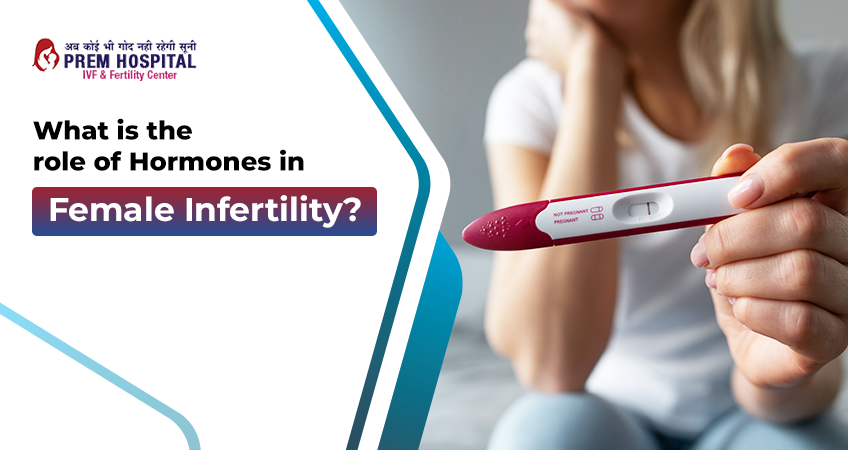The body needs hormones to function properly. The human body’s blood contains more than 50 recognized hormones that control internal organ systems and physical processes. These processes include growth, temperature regulation, and metabolism. Hormone imbalance can result from any aberration in the kind or quantity of hormones
Every woman’s cycle differs from another because of the natural hormone fluctuations that occur during the menstrual period. The intricate interactions between these hormonal networks greatly influence women’s fertility. Taking care of the right secretion of hormones is crucial during female infertility treatment.
Reasons for hormonal imbalance that may result in infertility
The most typical hormonal abnormalities that might lead to infertility or difficult pregnancy are caused by the following:
- An ovulation or Inability to Ovulate
An ovulation is a disorder in which a woman cannot ovulate. - Polycystic Ovarian Syndrome (PCOS)
A hormonal imbalance in PCOS causes the eggs to remain immature and develop into cysts in the woman. This frequently makes it harder to conceive and can result in infertility. - Hyperprolactinemia
The woman in this situation has too much prolactin in her body. They become infertile as a result, and their periods become irregular.
Each reason for hormonal imbalance must be taken care of as a part of female infertility treatment options.
Essential hormones and their role in female infertility
Here are the necessary hormones that influence fertility in females:
1. FSH or Follicle Stimulating Hormone
The menstrual cycle and egg production are managed using follicle-stimulating hormone (FSH). FSH levels are often checked on days two or three of the menstrual cycle to determine a woman’s ovarian function and evaluate egg quality.
In general, women who have high FSH levels in their blood on days two or three of menstruation have a lower likelihood of having a live birth than other women their age, excluding those who have fertility treatment for women and ovulation stimulation.
Currently, various laboratory procedures are employed to measure FSH blood levels, and evaluating these levels may differ based on the technique and the lab that carried out the operation. As a result, comparing blood levels that are checked is challenging.
2. Progesterone
Progesterone is produced by the ovaries shortly after ovulation. Progesterone prepares the uterus for fertilizing the eggs during the mid-term cycle, which occurs 12 to 16 days after the first day of menstruation.
Progesterone levels can be measured using fertility blood tests to determine how much is present in the bloodstream one week after ovulation, when they typically start to rise. A surgeon will perform mid-luteal serum progesterone fertility testing for females around day 21 of menstruation or if urinary LH predictor tests reveal a positive sign of ovulation. This is done as a part of female infertility treatment.
3. Oestrogen
Oestrogen is a hormone that aids in the development of the female reproductive system and regulates primary and secondary sex characteristics. Sometimes conception problems are attributed to estrogen dominance.
4. Luteinizing Hormone or LH
Luteinizing hormone, also known as LH, encourages the ovaries to produce an egg and to start producing progesterone, which primes the uterus to nurture the fertilized egg. Before ovulation, LH can be seen in a woman’s urine. This test aids in predicting ovulation by measuring the increase in LH in a urine sample. LH testing is frequently done to help increase the likelihood of a successful pregnancy. Prem Hospital Meerut offers great treatments for hormonal issues affecting pregnancy or fertility.
5. Oestradiol
The FSH test, along with the evaluation of oestradiol (a significant kind of estrogen), can be used to evaluate a woman’s ovarian function and the quality of her eggs. Additionally, this assessment is carried out on days two or three of the menstrual cycle. Infertility treatments frequently involve hormone testing.
The result of these evolutions does not necessarily indicate infertility, but excessively high levels are linked to a diminished response to ovulation stimulation drugs, which lowers the likelihood of a female infertility treatment success. Before beginning any procedure, the surgeon must assess the levels of the reproductive hormones.
-
Prolactin
Breast milk production depends on the prolactin hormone. But it does more than that. It is crucial in assisting women to get pregnant. You may have irregular periods and ovulation issues if your prolactin levels are abnormal.
-
Thyroid Hormones
By interacting with the progesterone and estrogen hormones, this hormone significantly helps a woman’s ovary and ovulation to function regularly.
-
Anti-Mullerian Hormone (AMH)
The ovarian follicles that house immature eggs are responsible for producing anti-Mullerian hormones. The amount of this hormone can be used to forecast how many eggs are still in the ovary. Reduced AMH frequently indicates infertility.
Conclusion
A woman’s body contains an intricate combination of hormones that play a role in fertility and reproduction. The two main hormones are FSH and LH, which regulate the ovarian response hormones progesterone and oestradiol. Each hormone, which swings with each phase of the menstrual cycle, is essential. Consult the best gynecologist doctor in Meerut before taking the necessary action.

